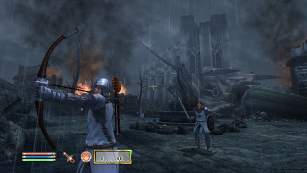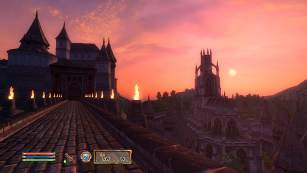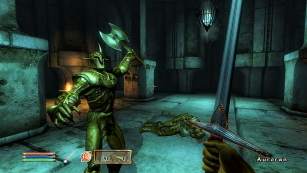Set in the darkest hours of a fading
mythical empire, Bethesda Software's epic role-playing title The Elder
Scrolls IV: Oblivion for the PS3 casts players as a lone adventurer
exploring a massive world that's under siege from dark forces. As the game
begins, the Emperor and his children are assassinated by these evil beings
and it's up to you to fight these forces before they completely over take
the world. You begin by selection which character and class you want to
be, and there are many races and types to choose from, ranging from humans
to elves and other creatures. Each race and class in Oblivion has their
own strengths and weaknesses, some are more powerful fighters while others
excel in magic and spells. These aren't strictly defined, but you can
generally have an idea where you want your character to go. Early on, you
can also choose which sign you'll be born under, which gives you
additional abilities such as improved resistance to fire attacks or the
ability to heal quickly. You begin the game with a quick dungeon crawl
which introduces you to some of the basic play mechanics as you fight
basic enemies such as large rats. As you fight and defeat enemies, your
experience and abilities will increase you'll be able to earn additional
items and inventory which you can equip or save to trade later. Obviously,
weapons are your most important item early on, and you'll find many types
of them to use ranging from swords to staffs and knives that you can use
to pummel your opponents. You'll also find a number of other items such as
gold, food, clothing and spells that will help you along in your quest.
You'll also find a number of chests and locked doors during the game, but
you can use any picks you find to open them. Each lock has a varying level
of difficulty which adds to the challenge.
 Once
you emerge from your initial journey under the sewers at the beginning,
you'll suddenly walk outside. Here, you'll find a much larger and more
massive world awaits you. Here, you can run in virtually any direction
through the massive world of Oblivion. As you explore the world of
Oblivion, you'll run into many other NPC characters, which you can
interact with. The game's talking system is quite elaborate and gives you
many options. You can choose to talk to them nicely, which usually results
in information given while others will take some persuasion. When you want
to convince someone to be on your side, you can use a wheel which gives
you various options such as joking, boasting or complimenting them. They
won't always respond favorably to your conversations, and some will be
hostile, but you can usually get some information on what to do next or
background on the empire itself. Some characters will also ask for your
help in completing tasks for them, which can result in some impressive
rewards. However, the game's non-linear approach and open-ended design
gives you plenty of freedom where you go and in what order you'll do it.
This allows you to decide which quests to perform and if you even decide
to perform them at all.
Once
you emerge from your initial journey under the sewers at the beginning,
you'll suddenly walk outside. Here, you'll find a much larger and more
massive world awaits you. Here, you can run in virtually any direction
through the massive world of Oblivion. As you explore the world of
Oblivion, you'll run into many other NPC characters, which you can
interact with. The game's talking system is quite elaborate and gives you
many options. You can choose to talk to them nicely, which usually results
in information given while others will take some persuasion. When you want
to convince someone to be on your side, you can use a wheel which gives
you various options such as joking, boasting or complimenting them. They
won't always respond favorably to your conversations, and some will be
hostile, but you can usually get some information on what to do next or
background on the empire itself. Some characters will also ask for your
help in completing tasks for them, which can result in some impressive
rewards. However, the game's non-linear approach and open-ended design
gives you plenty of freedom where you go and in what order you'll do it.
This allows you to decide which quests to perform and if you even decide
to perform them at all.
Oblivion's structure is open-ended, but
there are definitely defined tasks and missions that you'll need to
complete in order to progress through the game. These can be divided into
the main quests, which move the storyline forward and side-quests which
are basically used to increase your character's abilities. There's a
diverse set of goals you need to accomplish, and the fist thing you'll
generally need to do is make your character stronger. You can do this by
gaining experience in battle or by purchasing stronger weapons, armor and
spells in the many shops you'll find in the game. While you can build up
money quickly in the game by battling foes, you character's strength can
be increased most quickly by fighting the beasts you'll find outside in
the wilderness, attacking groups of orcs or trolls and even making quick
work of any unfortunate thieves who come across your path. Oblivion
diverges from most turn-based role-playing games and implements a
first-person melee attack system where you attack enemies in real time.
Pressing the action button allows you to take a quick swipe at them with
your weapons, you can also call on spells by pressing the shift button as
well. You can switch weapons and attacks before each battle, but can't
change your weapons while attacking. Most of the foes you encounter won't
put up much of a fight initially but later enemies require a strong
character with plenty of experience. The battles can be intense and most
players will probably take a lot of damage and suffer defeat frequently.
During the game's early stages, there
are many enemies that are probably best avoided, such as the omnipresent
guards that patrol the empire and other stronger characters. It pays not
to anger them, since they'll make quick work of you with little chance of
victory. Messing with the guards also has the effect of sentencing you to
jail and making you lose valuable items as they are confiscated from your
character. As you defeat foes, you can loot their bodies and take any
items they might have on them, which is another way to build up your
character. As you go deeper into the game, you can also recruit other
characters to join in your party as well, though they are all computer
generated. Many of the quests and missions you have to complete can be
long and elaborate and you'll need to make sure you have properly equipped
your character before you head out on your adventure. One of the best
things about Oblivion's design is that the game offers many auto-save
points and you can archive your progress at any time using pop-up menus.
This helps to reduce frustration and allows you to pick up right up where
you left off without backtracking. Oblivion's sheer scope and scale makes
this an important feature that lets you undertake the game in small
segments or extended sessions.
 One
of the key elements that makes this non-linear approach possible is the
sheer depth, nuance and complexity that the developers have put into the
game. There's an incredibly rich backstory to explore that makes the game
an immersive and engrossing experience. Many of the characters you
encounter during your adventure will offer you small snippets of the
larger storyline from their perspective, allowing a much richer narrative
to emerge as you go through the game. You'll also be able to purchase
numerous scrolls, books and newspapers, which further elaborate on the
storyline. Reading these might seem like a secondary task, but you should
take the time to look through them since many of them might contain
valuable information you can use in other areas. As you go through the
many sub-worlds in the game, you'll find different personality types
emerge and this makes the experience feel even more realistic. Characters
you encounter in the cities are generally more suspicious of your
motivations than those you find in the outlying areas. Their response to
you usually depends on what kind of approach you use in talking to them.
For example, when you enter a store or trading post, you can try and use
your character's powers of persuasion to lower their guard and their
prices, but you have to be careful not to cross the line unless you want
them to refuse your offers. This is all fairly straightforward in
implementation and design, but its still quite entertaining to interact
with these characters.
One
of the key elements that makes this non-linear approach possible is the
sheer depth, nuance and complexity that the developers have put into the
game. There's an incredibly rich backstory to explore that makes the game
an immersive and engrossing experience. Many of the characters you
encounter during your adventure will offer you small snippets of the
larger storyline from their perspective, allowing a much richer narrative
to emerge as you go through the game. You'll also be able to purchase
numerous scrolls, books and newspapers, which further elaborate on the
storyline. Reading these might seem like a secondary task, but you should
take the time to look through them since many of them might contain
valuable information you can use in other areas. As you go through the
many sub-worlds in the game, you'll find different personality types
emerge and this makes the experience feel even more realistic. Characters
you encounter in the cities are generally more suspicious of your
motivations than those you find in the outlying areas. Their response to
you usually depends on what kind of approach you use in talking to them.
For example, when you enter a store or trading post, you can try and use
your character's powers of persuasion to lower their guard and their
prices, but you have to be careful not to cross the line unless you want
them to refuse your offers. This is all fairly straightforward in
implementation and design, but its still quite entertaining to interact
with these characters.
You can also choose to take a darker
path and try and steal items from the merchants and other areas, but you
should avoid getting caught, since you may have to pay fines or even face
jail time. Resisting arrest by the guards, on the other hand, usually puts
you at the losing end of a battle with multiple guards. It's this subtlety
that makes the experience so rewarding and engrossing, making Oblivion
feel more like an actual world you enter and explore than a mere game
where you're just passing through. The game's open-ended approach also
helps to keep things interesting as you can choose whether to concentrate
on specific aspects of your character, build up alliances and skills by
joining guilds and groups or try and complete your journey on your own
with minimal interaction. It's completely your decision. The world is so
elaborately designed and implemented with such an attention to detail that
it really doesn't matter what path you take, the experience remains richly
rewarding and impressive from any perspective. It will probably take many
hours before you decide what exactly you want to do, but you should have
plenty of fun in the meantime. The game allows you to explore at your own
pace, and you can choose to enjoy the many diversions, such as betting on,
or even competing in arena battles, hunting, fishing and a variety of
tasks without worrying about the main quest. This variety is what makes
the game so rewarding and entertaining.
Adding to Oblivion's sense of immersion
is its thoroughly impressive graphics engine and design which creates an
impressive sense of scale and place that suspends disbelief effectively
throughout. Every element of the game, from its robust natural settings,
awe inspiring cities and beautiful lighting effects comes together to
create a cohesive, believable world. While its individual elements are
highly polished, the seamless nature in which they've been designed makes
the experience seamless. Oblivion's graphics engine features stunningly
detailed environments that transport you into its world. You can see
individual blades of grass in outdoor settings, cracks in the massive
stone walls of elaborate castles, blazing fires from a distance plus
realistic environmental effects such as water, rain, fire, snow, wind and
day or night settings, all rendered in high-resolution to effectively take
advantage of high definition monitors. Things move along at a consistent
and smooth frame rate throughout.
 The
level of detail evident in every element of the game is astonishing and
extends even to the other characters, who show emotions with elaborate,
nearly photo-realistic facial expressions that make them seem very much
alive. The sheer number and scope of environments and worlds you'll
explore during your stay in Oblivion is impressive, with each area showing
an astonishing level of detail and nuance. The Playstation 3 edition of
Oblivion looks a little bit sharper and more defined than it did on Xbox
360, and this version also showcases slightly faster loading times.
Unfortunately, there are still too many of these breaks, which occur every
time you enter a new area. It does hurt the pacing and flow of what is
otherwise one of the more impressive role-playing titles to date.
Oblivion's musical score does an excellent job of setting an appropriately
epic mood, and its extensive use of voice acting helps to bring the
characters to life even more vividly. The game's production values are
superlative throughout and make this one of the most immersive
role-playing titles to appear on next-gen consoles to date. In the end,
the level of detail evident throughout the game is impressive, and the
brilliant developers at Bethesda Softworks deserve plenty of credit for
creating such an impressive graphics engine.
The
level of detail evident in every element of the game is astonishing and
extends even to the other characters, who show emotions with elaborate,
nearly photo-realistic facial expressions that make them seem very much
alive. The sheer number and scope of environments and worlds you'll
explore during your stay in Oblivion is impressive, with each area showing
an astonishing level of detail and nuance. The Playstation 3 edition of
Oblivion looks a little bit sharper and more defined than it did on Xbox
360, and this version also showcases slightly faster loading times.
Unfortunately, there are still too many of these breaks, which occur every
time you enter a new area. It does hurt the pacing and flow of what is
otherwise one of the more impressive role-playing titles to date.
Oblivion's musical score does an excellent job of setting an appropriately
epic mood, and its extensive use of voice acting helps to bring the
characters to life even more vividly. The game's production values are
superlative throughout and make this one of the most immersive
role-playing titles to appear on next-gen consoles to date. In the end,
the level of detail evident throughout the game is impressive, and the
brilliant developers at Bethesda Softworks deserve plenty of credit for
creating such an impressive graphics engine.
While it would be easy to criticize
Oblivion's smaller faults, stepping back and taking a look at the bigger
picture shows a game that easily transcends any of its minor mistakes. Its
non-linear structure makes it easy to play for either small or long
sessions and provides players with an incredible sense of freedom and
possibility that keeps you immersed in the action. Its diverse array of
tasks, quests and missions keeps your interest levels high throughout.
You'll immediately see a level of richness and detail in its design, back
story and execution that makes the experience feel all the more immersive
and engaging. Oblivion effectively transports players into a parallel
fantasy world that feels as rich and believable as a novel. The scope and
scale of the game is impressive and brings with it an incredible sense of
being in the center of a great adventure. The gameplay and storyline are
quite enjoyable, with a control system and interface that's easy to use
while also giving you plenty of flexibility. There are a few minor issues,
such as load times, that keep the game from perfection, but Oblivion still
delivers one of the most engaging and exciting next generation role
playing titles to date. This is a solidly entertaining and engrossing
title and those who haven't experienced this fantastic title yet owe it to
themselves to play this on the Playstation 3, which offers the smoothest
playing version of the game yet.
- Michael Palisano
Grade:
A

